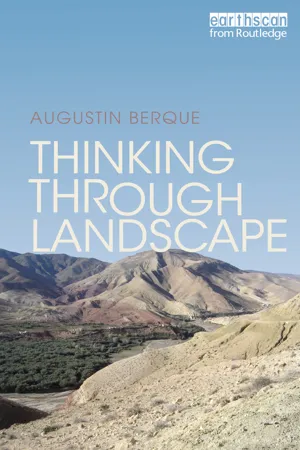
- 96 pages
- English
- ePUB (mobile friendly)
- Available on iOS & Android
Thinking through Landscape
About this book
Our attitude to nature has changed over time. This book explores the historical, literary and philosophical origins of the changes in our attitude to nature that allowed environmental catastrophes to happen.The book presents a philosophical reflection on human societies' attitude to the environment, informed by the history of the concept of landscape and the role played by the concept of nature in the human imagination. It features a wealth of examples from around the world to help understand the contemporary environmental crisis in the context of both the built and natural environment.
Berque locates the start of this change in human labour and urban elites being cut off from nature. Nature became an imaginary construct masking our real interaction with the natural world. He argues that this gave rise to a theoretical and literary appreciation of landscape at the expense of an effective practical engagement with nature. This mindset is a general feature of the world's civilizations, manifested in similar ways in different cultures across Europe, China, North Africa and Australia. Yet this approach did not have disastrous consequences until the advent of western industrialization.
As a phenomenological hermeneutics of human societies' environmental relation to nature, the book draws on Heideggerian ontology and Veblen's sociology. It provides a powerful distinction between two attitudes to landscape: the tacit knowledge of earlier peoples engaged in creating the landscape through their work - "landscaping thought"- and the explicit theoretical and aesthetic attitudes of modern city dwellers who love nature while belonging to a civilization that destroys the landscape - "landscape thinking".
This book gives a critical survey of landscape thought and theory for students, researchers and anyone interested in human societies' relation to nature in the fields of landscape studies, environmental philosophy, cultural geography and environmental history.
Tools to learn more effectively

Saving Books

Keyword Search

Annotating Text

Listen to it instead
Information
Table of contents
- Cover
- Half Title
- Title Page
- Copyright Page
- Table of Contents
- List of illustrations
- 1 The waves of history
- 2 The earth, acting spontaneously
- 3 The third day of the third month
- 4 They do not know how to look
- 5 While having substance, it tends toward the spirit
- 6 An obscure thing before it is said
- Codicil: for those who would want to overcome modernity
- Notes
- Bibliography
- Index of people
- Index of places
- Index of terms
Frequently asked questions
- Essential is ideal for learners and professionals who enjoy exploring a wide range of subjects. Access the Essential Library with 800,000+ trusted titles and best-sellers across business, personal growth, and the humanities. Includes unlimited reading time and Standard Read Aloud voice.
- Complete: Perfect for advanced learners and researchers needing full, unrestricted access. Unlock 1.4M+ books across hundreds of subjects, including academic and specialized titles. The Complete Plan also includes advanced features like Premium Read Aloud and Research Assistant.
Please note we cannot support devices running on iOS 13 and Android 7 or earlier. Learn more about using the app